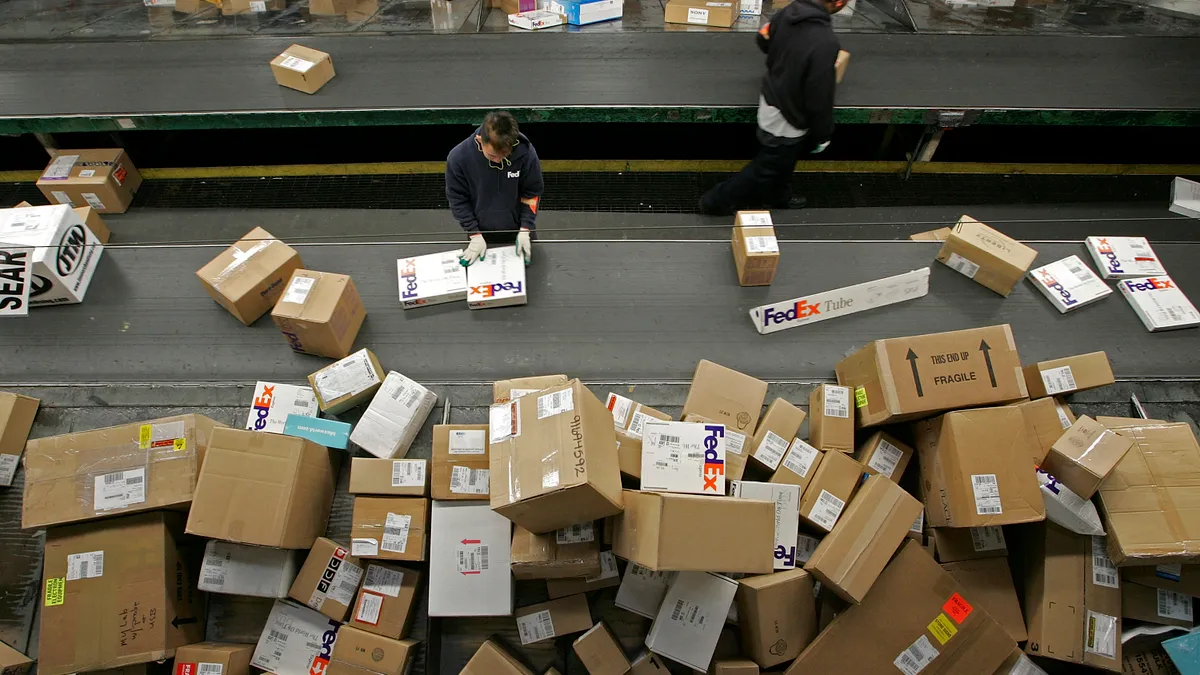Dive Brief:
- FedEx will increase three peak surcharges on Express and Ground shipments beginning June 21, the carrier announced in an update Friday.
- Affected surcharges include the additional handling surcharge, a residential delivery surcharge and a peak surcharge on Ground Economy. Oversized peak surcharges remain the same.
- FedEx cited high volumes and tight capacity, stemming from the pandemic, as reasons to increase the surcharges.
Dive Insight:
FedEx's network has been dealing with elevated volume over the last year that has resulted in a series of surcharges meant to aid in capacity management. But it all comes at a cost for companies shipping with FedEx.
Trevor Outman, the co-CEO at Shipware, noted the surcharges will have a "significant impact to FedEx shippers. This is not a small increase!"
FedEx's surcharges
| Surcharge | Relevant service | Amount | Effective date |
|---|---|---|---|
| Peak Oversize Surcharge | U.S. Express Package Services, U.S. Ground Services, International Ground Service | $30 per package | Jan. 18, until further notice |
| Peak Additional Handling Surcharge | U.S. Express Package Services, U.S. Ground Services, International Ground Service | $3 per package $3.50 per package |
Jan. 18 – June 20 June 21 until further notice |
| Peak Surcharge | FedEx Ground Economy Package Services | $0.75 per package $1 per package |
Jan. 18 – June 20 June 21 until further notice |
| Peak Residential Delivery Charge | FedEx Express and FedEx Ground U.S. domestic residential packages | $0.30 per package $0.60 per package |
Feb. 15 – June 20 June 21, until further notice |
SOURCE: FedEx
The residential surcharge could be especially impactful for e-commerce shippers, Outman said in an email.
"The Residential Surcharge increases 100% to $0.60 per packages," he said. "This will have a direct impact on all direct to consumer eCommerce businesses; doubling their current residential surcharge costs!"
UPS has also increased surcharges over the course of the pandemic. This month, UPS increased surcharges on international shipments from multiple locations — including Hong Kong, China and Taiwan — to the U.S.
Rob Martinez, the founder and other co-CEO at Shipware, said his company is trying to figure out how the increased fees will impact its client base. But he noted the current environment is increasingly eroding retailer's margins, a reality that will need to give at some point.
"The lack of competitors delivering parcels in North America (90%+ volume handled only by FedEx, UPS, and US Postal Service) has led to sky-rocketing margins for the carriers, and out-of-control rates for shippers," Martinez said in an email.
Shippers have spoken about the rates and margins as they report their financial performance.
"Embedded in our earnings outlook is the continued impact of incremental shipping surcharges and higher commodity prices on our gross margin," The Container Store CFO Jeff Miller said on the company's earnings call last week.
And at the end of last year, Williams-Sonoma's CFO noted that the company's margin expansion "was partially offset by higher shipping costs year-over-year, driven by the substantial shift to e-commerce sales in the quarter as well as shipping surcharges from our third-party [providers]."
Nate Skiver, the founder of consulting firm LPF Spend Management, said carrier diversification is one tactic to combat the peak surcharges, particularly for medium to large shippers.
"By moving volume to alternate carriers, shippers can either reduce expense or remain below volume thresholds which trigger FedEx and UPS peak surcharges," Skiver said in an email.
But even regional carriers have set some peak surcharges over the last year, as they follow the pricing standard set by FedEx and UPS, Skiver said.
Last summer, FedEx executives referred to the surcharge ecosystem as "the new normal." With the surcharges set to increase further, that philosophy appears to still be solidly in place.
"As we plan for peak of fiscal year 2022, our peak surcharges will continue to play a critical role," FedEx Chief Marketing and Communications Officer Brie Carere said in March.
Skiver and parcel consultant Jerry Hempstead said similar increases could now follow from UPS. Skiver said the two logistics companies have "moved in tandem with issuing peak surcharges."
"Not the best time to be a shipper," Hempstead said in an email.
















